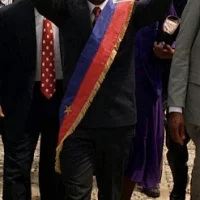Egypt and the Suez Canal became a point of global strategic interest during WWII because of the quick access the waterway could provide to Middle East oil, raw materials from Asia, and– for the British Empire particularly– a connection to its distant territories. Britain, as the first state to launch a completely mechanized military, was particularly… Read More "Raymond Hare: Our Man in Cairo during WWII"
Foreign Service Newly-Weds in 1960s Yemen
Since the dissolution of the Ottoman Empire, Yemen was been a hot spot for unrest in the Middle East. The 1960s saw instability and hostile relations between the socialist South Yemen and the authoritarian Yemen Arab Republic (YAR), also known as North Yemen. The YAR was in the midst of a bloody civil war that… Read More "Foreign Service Newly-Weds in 1960s Yemen"
CNN, Tanks, and Glass Walls: The August 1991 Coup
In August of 1991, hard-liners opposed to Soviet President Mikhail Gorbachev initiated a coup attempt to overthrow him. The rebellion occurred in part because of financial strife as the Soviet Union transformed quickly from a statist to a market-based economy. Long lines formed for essential goods including medicine and fuel, and grocery shelves were empty.… Read More "CNN, Tanks, and Glass Walls: The August 1991 Coup"
On April 6, 1994, the presidents of Rwanda and Burundi were assassinated when their plane was shot down near Kigali airport and crashed into the grounds of the Rwandan presidential residence. The incident ignited genocide by the majority Hutus against Tutsis and against those supporting peace negotiations to bring Rwanda out of civil war. An… Read More "Fleeing Rwanda to Survive, then Returning to Rebuild, 1994"
Haiti has long been plagued by coups d’état and regime changes, leading to long-time political instability and weak governance. In this volatile political field, it was easy for a Haitian leader to assume dictatorial powers, as was the case with President François Duvalier, also known as “Papa Doc.” After becoming the President of Haiti in… Read More "The Overthrow of Haiti’s Aristide"
“How many people can you fit on a 747?”- Operations Sheba and Solomon
The Ethiopian Aliyah, as it is known in Israel, was the migration during the 1980’s of thousands of Ethiopian Jews [known in Amharic as Falashas; some consider the term pejorative] to Israel. The Israeli Defense Force (IDF) played a major role in the evacuation of the Ethiopian Jews as they came under increasing threat from… Read More "“How many people can you fit on a 747?”- Operations Sheba and Solomon"
An Embassy in Flames: Islamabad, 1979
The November 21, 1979 attack on the American Embassy in Islamabad started as a small group demonstration in front of the embassy, where protesters shouted anti-American slogans and demanded entry into the campus. Police officers were able to stop the protesters and have them leave the area. However, about fifteen minutes later, some six busloads of Pakistani… Read More "An Embassy in Flames: Islamabad, 1979"
Get While the Getting’s Good: Departing Communist China
The decision to close an embassy and order departure of diplomatic personnel is a signal of last resort that bilateral relations are damaged and unlikely to improve soon. This occurred in China when Chiang Kai-shek’s Nationalist Party fled the capital and retreated to Taiwan on December 8, 1949 in the wake of Mao Zedong’s establishment… Read More "Get While the Getting’s Good: Departing Communist China"
Operation Storm — The Battle for Croatia, 1995
After the fall of Yugoslavia in the early 1990’s, the Balkans descended into a bloody ethnic and sectarian conflict. Although there were roughly six discrete Yugoslav conflicts, the first major war was the Croatian War for Independence. Starting in 1991, when Croatia declared its independence as a nation-state, the war was fought between forces loyal… Read More "Operation Storm — The Battle for Croatia, 1995"
The Panama Riots of 1964: The Beginning of the End for the Canal
When President Theodore Roosevelt signed the Hay-Bunau-Varilla Treaty with Panama in 1903, the United States gained sovereignty over the portion of the newly formed country of Panama which would become the Panama Canal, a modern-day marvel that revolutionized international shipping and solidified America as a global power. While the benefits to the U.S. were enormous, the politics… Read More "The Panama Riots of 1964: The Beginning of the End for the Canal"


